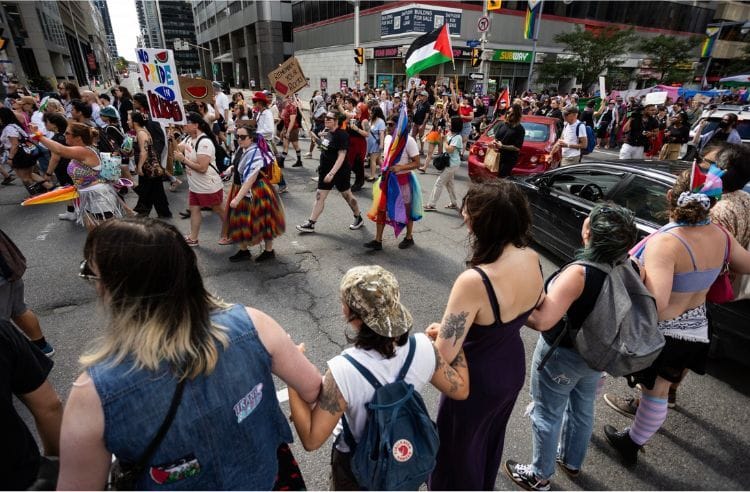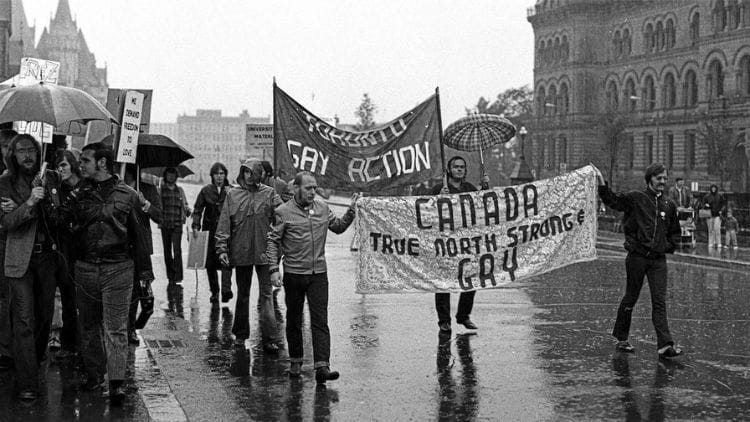The sun was shining and rainbow flags were flying in downtown Ottawa as thousands lined the streets for the annual Capital Pride parade on Sunday.
The floats and marchers started the route as planned, but were stopped outside Parliament Hill by a group called Queers for Palestine, who blocked the road in an attempt to negotiate with organizers.
Queers for Palestine said they halted the parade with permission from the grand marshal Miss Patience, who invited the group to march alongside her. They demanded Capital Pride host a "boycott, divestment and sanctions" town hall, while committing to a cultural and academic boycott of Israel.
Last year, Capital Pride issued a statement recognizing "the ongoing genocide against Palestinians”, which received mixed opinions. Many groups, including the Children’s Hospital of Eastern Ontario, the Ottawa-Carleton District School Board, Carleton University, and many city officials including Mark Sutcliffe, decided not to participate.
But this year Pride organizers discreetly removed that messaging from their website, but said in media interviews their stance hasn’t changed. It reopened the debate with some demanding it be included again.
Another demand Queers for Palestine had was for Mayor Mark Sutcliffe and other elected officials to apologize for boycotting last year. But the Mayor has refused and said no apology is warranted.
“I don’t think we want to have a situation where anybody can just block a parade – especially Capital Pride – put a bunch of demands on the table, and the parade doesn’t move forward unless people give in to those demands. I don’t think that’s acceptable,” said Sutcliffe. “I don’t think that’s a proper way to advocate or discuss the issues that are important to those people, I certainly was not in a position to say, yes, I’ll do whatever they ask.”
Sutcliffe also went on to say he boycotted last year as a personal matter, and noted that every year he participates in many pride events to show support to the LGBTQ2S+ community.
The festival first put out a statement saying the parade would be delayed, but soon after, noted it would have to be cancelled.
“Throughout the summer, we had several meetings with Q4P along with other community groups to discuss the issues that are important to them,” Capital Pride said in a statement. “Unfortunately, the group refused to have a meaningful discussion about how to move forward. After over an hour of attempting to resolve the stoppage, it became clear that Q4P was unwilling to engage in a good-faith conversation and was insistent on misrepresenting our discussions.
History of the Ottawa Pride movement
Unlike most places, which celebrate Pride Month in June, Ottawa’s Capital Pride festivities are hosted in August because of historical events.
It was a rainy day on Aug. 30, 1971, when about 80 men and women demonstrated in support of homosexual rights the front lawn of Parliament Hill – the first time a demonstration of this kind was held in Canada. Billed as Gay Day, it called for an end to the discrimination against homosexual individuals.
It was a different world from the one we know today. Public servants could be fired for their sexual orientation and forced to use the “fruit machine” — a battery of psychological tests developed by a Carleton University professor to test if people were homosexual.
In 1975, 34-year-old Warren Zufelt jumped to his death from the rooftop of his condo building at 20 Chesterton Dr. in Nepean. The public service worker was accused and charged with gross indecency in connection with a male prostitution ring involving juveniles. The ring uncovered March 4, 1975, also led to the arrest of 17 other men. Their names and addresses were posted in the local media.
During the trial, branded “Ottawa’s sex scandal”, it was revealed that the 16-year-old prosecution’s chief witness was coached on what to say by police. The youth committed suicide during the trial.
While the gay bathhouse raids in Toronto and Montreal are more widely known, similar events took place in Ottawa, including the May 1976 raid of the Club Ottawa Bathhouse on Wellington Street West. Police charged two men with gross indecency and 22 others with being “found-ins”
The 1980s brought a lot of tragedy to the Ottawa gay community. It began with the AIDS epidemic, with Peter Evans, a bisexual man in his 30s, who was the Capital’s first diagnosed case.
Then came violence. In 1989, at least 15 hate crimes were reported targeting the Ottawa Queer community. On Aug. 21, Alain Brosseau was dangled over the Alexandra Bridge connecting Ottawa to Gatineau and fell to his death in the water below. While Brosseau was believed to be straight, his killing was done on the assumption of his sexual orientation because of the shoes he wore. Also that night, Alain Fortin and Wilfred Gauthier were stabbed in their Orleans home by the same gang members. Both survived.
But progress was on the horizon. Ottawa’s first-ever Pride parade occurred on June 18, 1989. Over the years, it picked up more support, even if not everyone was on board.
Alex Munter, the first openly gay politician in the Ottawa area, came out in 1993. He said during his first Capital Pride parade two years later, there were “more gawkers than participants — some even there to see if they could spot someone they knew, others there to throw eggs.”
Munter faced a lot of love when he decided to live as his authentic self. But he received hate, too. Munter and his then-boyfriend were stopped on the street and faced homophobic remarks by a carload of young men. People also wrote in the Kanata Courier paper saying he wasn’t capable of being a councillor because of his sexual preference.
Decades later, in 2019, Munter received the unexpected: an anonymous letter from someone who had defaced his municipal election signs all those years earlier.
“I am truly sorry for doing this to you. We were dumb teenage boys,” the handwritten letter read. “You are an outstanding member to the community and are truly special.”





